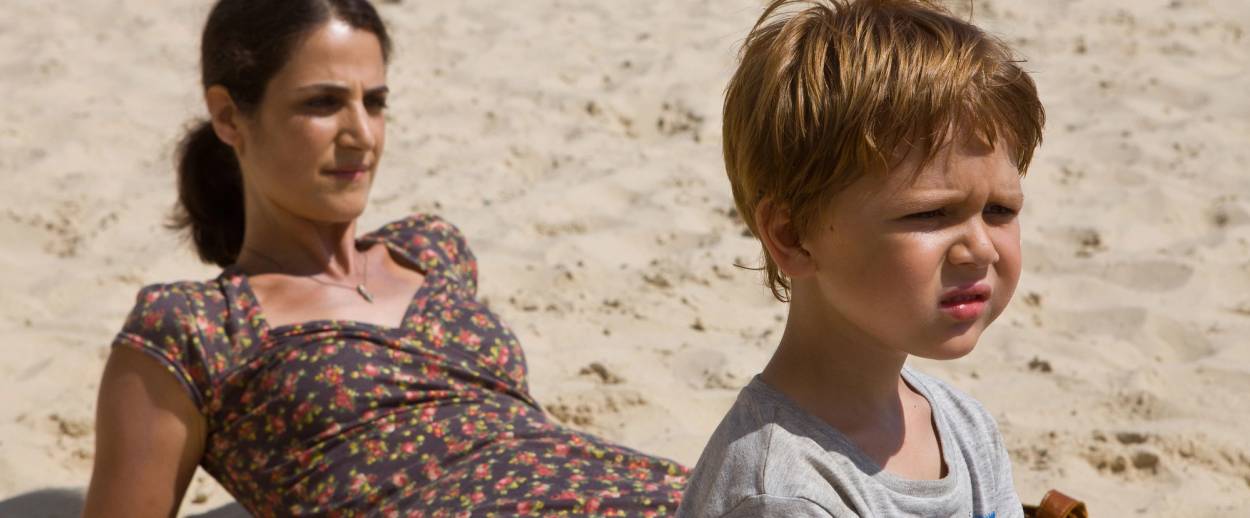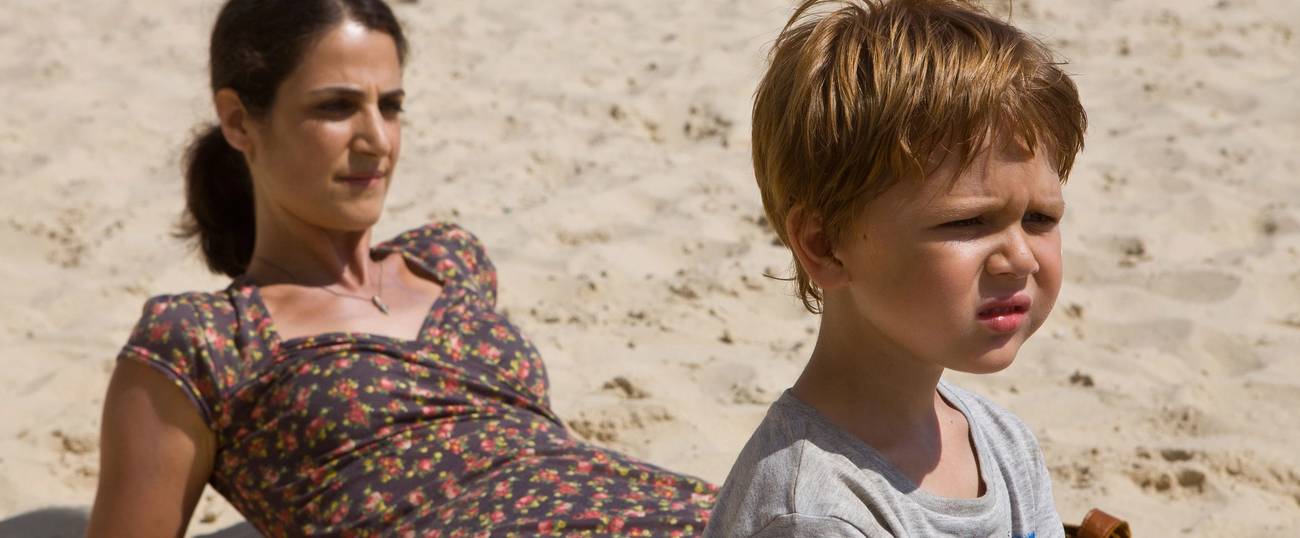Nadav Lapid’s Genius Sees Israeli-ness as an Existential Disease
The internationally acclaimed filmmaker’s new ‘The Kindergarten Teacher’ takes Jewish insularity to terrific extremes




The subject of writer-director Nadav Lapid’s latest movie is a precocious 5-year-old poet. Lapid, who is 40, can hardly be considered a child prodigy. Still, his two features, Policeman (2011), available through Netflix, and The Kindergarten Teacher (2014), which opens this Friday in New York, have made him the most internationally acclaimed Israeli filmmaker in recent memory… and perhaps ever.
Policeman, a multiple-award winner at the 2011 Jerusalem Film Festival, is a sardonic, deeply fascinating character study in which two violent, self-absorbed quasi-tribal groups—one a highly disciplined elite police commando unit, the other an anarchic band of left-wing Jewish terrorists—find each other, with predictable results, at the wedding of a billionaire’s daughter in contemporary Tel Aviv.
Lapid’s approach is brilliantly schematic (some would say “dialectical”). Parallel, but not unrelated, worldviews collide, leaving ample collateral damage. Policeman begins with the anti-terrorist unit bicycling into the desert, standing on a hilltop shouting into the empty valley below that theirs is “the most beautiful country in the world.” Their antagonists, by contrast, are introduced midway through the film, out in the hills taking target practice on an olive tree.
Olivier Père, the head of the Locarno Film Festival, where Policeman received a special jury prize in 2011, called Lapid’s laconic juxtaposition of ultra-macho muscle Jews and fanatical neo-narodniks “the best political film in ages (including and especially in Israel).” Writing in the New York Times, when Policeman opened in New York in June 2014, Manohla Dargis hailed it as “an electrifying feature film debut.”
Lapid, who has described his subject matter as “Israeli everyday-ness,” has described Policeman as “a pessimistic film about social immobility and incapacity to change reality.” The same could also be said about the less overtly political but equally, if more obscurely, allegorical Kindergarten Teacher. Fanaticism is again Lapid’s subject. Nira, a would-be poet and the film’s eponymous protagonist, becomes obsessed with protecting the genius she attributes to Yoav, one of the children in her class: For the teacher, her pint-sized charge is a redemptive figure, “a poet in an era that hates poets.”
Dealing as it does with groups of children, The Kindergarten Teacher is necessarily more spontaneous and less schematic than Policeman, but its critical attitude is immediately apparent; a movie about poetry or the power of words, it begins with an Israeli TV comedian making a lame joke about Hitler in hot-pants. While The Kindergarten Teacher is as resistant to easy parsing as Yoav’s (or rather the filmmaker’s) precocious poems, the purity of his language is opposed to a prevailing corruption, at least in Nira’s mind. The child of poor Sephardim whose only books were prayer books, she believes that “being a poet is opposing the nature of the world.” For her, Yoav is something of an oracle, abruptly declaring, “I have a poem” and then pacing back and forth as if possessed to recite it.
Is he a prophet—or, no less miraculous, is he an angst-ridden, romantic adolescent in the body of a 5 year old? In any case, the boy’s father, a successful and high-powered restaurateur, is indifferent to Yoav’s gift. (He is also contemptuous of his brother, a failed writer, who first introduced Yoav to poetry.) One of the movie’s funnier riffs has Yoav and his best friend, whose father is a member of Tel Aviv’s Maccabi soccer team, engaging in a game where they jump up and down, screaming violent and profane insults at each other. It is of course, a kindergarten teacher’s responsibility to teach children to play “nicely.” As an alternative, Nira leads her class in singing the Hanukkah song “Mi Yamalel” (“Who Can Retell?”), with its proud assertion that “in every age, a hero or sage came to our aid.” She then picks her “child poet” to play Judah Maccabi.
***
Lapid’s movies have a strong sense of place, but he is not a straightforward naturalist. The two contemporary filmmakers whom he has cited as inspirations—the Mexican provocateur Carlos Reygadas and Turkey’s poet of middle-class alienation Nuri Bilge Ceylan—are both given to movies that contrive quests through or bury symbols in their carefully observed landscapes, although Lapid’s own adroit camera placement and interest in social types suggest more subtle cine-psychologists like R.W. Fassbinder and Olivier Assayas. Like them, Lapid has a knack for intimacy. He favors close-ups and eschews transitional shots.
Lapid’s evident sympathy for all of his characters may put him in the humanist tradition of Jean Renoir, but his discomfiting portrayals are ultimately Hitchcockian, which is to say his movies are analytical. They preclude easy audience identification with either the varieties of militant utopianism or the self-interested materialism articulated in his films. Although both films have strong narrative arcs ending in desperate acts of extreme zealotry, the stories themselves emerge out of anecdotal shards and include digressive scenes that function as enigmatic parables—both feature strange encounters in restaurants and dance clubs. The Kindergarten Teacher pauses for five minutes so that Nira can hip Yoav to the distinction between Ashkenazi and Sephardic Jews.
Lapid’s movies are not named for individuals but rather their roles as protectors of civil order and involve a paradoxical interplay between claustrophobic fantasy and open-ended reality. Policeman and The Kindergarten Teacher put forth speculative scenarios while using documentary material. Lapid himself was born into a family of artists. (His mother has edited both of his features.) The child poet in The Kindergarten Teacher is played, with impressive inscrutability, by an actual 5 year old (Avi Shnaidman), reciting short, highly charged poems that Lapid had composed himself between the ages of 5 and 7. The part of the kindergarten teacher is taken by an actual pedagogue and activist, Sarit Larry, who rebelled against her devoutly religious family to become a teenage actress, then abandoned a successful career at 26 to study philosophy (and here made her first movie in 16 years).
But while each movie allows its title character to express their individuality through wild solo dances, particularly striking in movies that eschew background music, both parody the avant-gardists and intellectuals who might be imagined as the filmmaker’s natural constituency. The performance piece in Policeman where an actor repeatedly chants “I am Vanunu” (in reference to the Israeli nuclear scientist who revealed the extent of Israel’s nuclear weapons program in 1986) is surpassed in posturing only by the poetry reading in The Kindergarten Teacher in which one heavy-set poet envisions all of Tel Aviv trembling in response to her enthusiastic love-making.
However, while Policeman anticipated the anti-capitalist demonstrations that broke out during the summer of 2011 (and that resulted in the movie getting the Israeli equivalent of an N-17 rating), something is blatantly missing from Lapid’s Israel. Neither Policeman nor The Kindergarten Teacher includes Palestinians, or even Israeli Arabs, in its cast of characters (although a significant secondary figure in The Kindergarten Teacher is apparently African-Israeli).
Particularly in Policeman, where the commandos are dumbfounded that the terrorists they’ve been sent to neutralize are Jews, the lack of Arabs is a structuring absence; in both movies, this omission reinforces a sense of insularity that is mirrored in the filmmaker’s self-absorbed, if not narcissistic, characters.
The policemen, the radicals, and the kindergarten teacher, as well as many of the other figures they encounter, are alike in dramatizing their particular ideology or fulfilling their predetermined destiny. The “other” goes unrecognized. “I believe that Israeli society has developed a hermetic way of looking at the world,” Lapid told Anthony Kaufman, who interviewed him last year for the Filmmaker website. “It justifies everything, like we are the victims, and we are in permanent danger, and it creates a perfect order.”
Lapid characterized this condition as an Israeli “sickness.” At one point, Policeman’s Alpha-male protagonist is transfixed by a terrorist’s dead gaze, imagining perhaps that she died trying to tell him something. The Kindergarten Teacher has little interest in income inequality although it is nevertheless clearly concerned with something Lapid calls “the collective soul of Israel”—but to what end?
When The Kindergarten Teacher was shown last April at the Museum of Modern Art, Lapid characterized Nira in charged apocalyptic political terms: “She wants to change a world that has gone wrong. She is a terrorist of poetry, a jihadist of poetry.” She is, in short, consumed to the point of alienation by her own militantly millennial worldview and, compelled to protect the flame of Yoav’s genius, is driven to take matters into her own hands.
In his interview with Filmmaker, Lapid remarked that his next movie would concern the Israeli diaspora. Set in Paris, where he lived for several years, it would be “the story of an Israeli guy who decides to leave Israel to heal himself from the Israeli sickness and to become French.” But to judge from Policeman and The Kindergarten Teacher, that “sickness” is an existential condition. Lapid’s protagonist will leave Israel only to become more Israeli.
***
For more of J. Hoberman’s film criticism for Tablet magazine, click here.
J. Hoberman was the longtime Village Voice film critic. He is the author, co-author, or editor of 12 books, including Bridge of Light: Yiddish Film Between Two Worlds and, with Jeffrey Shandler, Entertaining America: Jews, Movies, and Broadcasting.